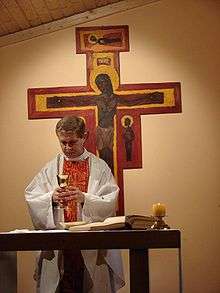Definify.com
Webster 1913 Edition
Mass
Mass
Mass
,Mass
,To rage.
Mass
,And raze their faction and their family.
Brhold this pattern of thy
Of
Webster 1828 Edition
Mass
M`ASS
,M`ASS
,M`ASS
,M`ASS
,Definition 2026
Mass
Mass
English
Noun
Mass (plural Masses)
- (Roman Catholic Church) The principal liturgical service of the Church, including a scripture service and a eucharistic service, which includes the consecration and oblation (offering) of the host and wine. One of the seven sacraments.
- A similar ceremony offered by a number of Christian sects.
- (music) A musical composition set to portions of the Mass.
Derived terms
|
|
Related terms
Translations
|
|
| |
- Italian: messa (it) f
- Portuguese: missa (pt) f
- Russian: ме́сса (ru) f (méssa)
- Swedish: mässa (sv) c
Anagrams
Faroese
Proper noun
Mass m
- A male given name.
Usage notes
Patronymics
- son of Mass: Massson
- daughter of Mass: Massdóttir
Declension
| Singular | |
| Indefinite | |
| Nominative | Mass |
| Accusative | Mass |
| Dative | Massi |
| Genitive | Mass |
mass
mass
English

Pronunciation
- IPA(key): /mæs/
- Rhymes: -æs
Noun
mass (countable and uncountable, plural masses)
- (physical) Matter, material.
- A quantity of matter cohering together so as to make one body, or an aggregation of particles or things which collectively make one body or quantity, usually of considerable size; as, a mass of ore, metal, sand, or water.
- 1718 [1704], Isaac Newton, Opticks, Second Edition:
- And if it were not for theſe Principles the Bodies of the Earth, Planets, Comets, Sun, and all things in them would grow cold and freeze, and become inactive Maſſes ; […] .
- 1821, George Buchanan (Latin original Rerum Scoticarum Historia, 1582), translator not named, The History of Scotland, from the Earliest Accounts of that Nation, to the Reign of King James VI, Volume 1, page 133,
- […] and because a deep mass of continual sea is slower stirred to rage.
- 1718 [1704], Isaac Newton, Opticks, Second Edition:
- (obsolete) Precious metal, especially gold or silver.
- 1596, Edmund Spenser, The Faerie Queene, IV.10:
- Right in the midst the Goddesse selfe did stand / Upon an altar of some costly masse […].
- 1596, Edmund Spenser, The Faerie Queene, IV.10:
- (physics) The quantity of matter which a body contains, irrespective of its bulk or volume. It is one of four fundamental properties of matter. It is measured in kilograms in the SI system of measurement.
- (pharmacy) A medicinal substance made into a cohesive, homogeneous lump, of consistency suitable for making pills; as, blue mass.
- (medicine) A palpable or visible abnormal globular structure; a tumor.
- (bodybuilding) Excess body weight, especially in the form of muscle hypertrophy.
- 1988, Steve Holman, "Christian Conquers Columbus", Ironman 47 (6): 28-34.
- After all, muscle maniacs go "ga ga" over mass no matter how it's presented.
- 1988, Steve Holman, "Christian Conquers Columbus", Ironman 47 (6): 28-34.
- A quantity of matter cohering together so as to make one body, or an aggregation of particles or things which collectively make one body or quantity, usually of considerable size; as, a mass of ore, metal, sand, or water.
- A large quantity; a sum.
- 1829, Sir Walter Raleigh, The Works of Sir Walter Ralegh, Kt, Volume VIII,
- […] he hath discovered to me the way to five or six of the richest mines which the Spaniard hath, and whence all the mass of gold that comes into Spain in effect is drawn.
- 1869, Alexander George Richey, Lectures on the History of Ireland: Down to A. D. 1534, page 204,
- For though he had spent a huge mass of treasure in transporting his army, […] .
- 1829, Sir Walter Raleigh, The Works of Sir Walter Ralegh, Kt, Volume VIII,
- (quantity) Large in number.
- Bulk; magnitude; body; size.
- c.1599-1601, William Shakespeare, The Tragedy of Hamlet, Prince of Denmark, Act 4, Scene 4,
- Witness this army of such mass and charge / Led by a delicate and tender prince,
- c.1599-1601, William Shakespeare, The Tragedy of Hamlet, Prince of Denmark, Act 4, Scene 4,
- The principal part; the main body.
- 1881, Thucydides, Benjamin Jowett Thucydides translated into English, Volume 1, page 310,
- Night closed upon the pursuit, and aided the mass of the fugitives in their escape.
- 1881, Thucydides, Benjamin Jowett Thucydides translated into English, Volume 1, page 310,
- A large body of individuals, especially persons.
- The mass of spectators didn't see the infraction on the field.
- A mass of ships converged on the beaches of Dunkirk.
- (in the plural) The lower classes of persons.
- The masses are revolting.
- Bulk; magnitude; body; size.
See also
- Customary units: slug, pound, ounce, long ton (1.12 short tons), short ton (commonly used)
- Metric units: gram (g), kilogram (kg), metric ton
Derived terms
|
|
Translations
|
|
|
|
Verb
mass (third-person singular simple present masses, present participle massing, simple past and past participle massed)
- (transitive) To form or collect into a mass; to form into a collective body; to bring together into masses; to assemble.
- 1829, William Burke, John Macnee, Trial of William Burke and Helen M'Dougal: Before the High Court of Judiciary, William Hare,
- They would unavoidably mix up the whole of these declarations, and mass them together, although the Judge might direct the Jury not to do so.
- 1857, Edward Henry Nolan, The Illustrated History of the War against Russia, Parts 93-111, page 432,
- Every bend on the hill had acted like a funnel to mass them together in this peculiar way.
- 1869, H. P. Robinson, Pictorial Effect in Photography: Being Hints on Composition and Chiariscuro for Photographers,
- Where there is too great a repetition of forms, light and shade will break them up or mass them together.
- 1829, William Burke, John Macnee, Trial of William Burke and Helen M'Dougal: Before the High Court of Judiciary, William Hare,
- (intransitive) To have a certain mass.
- I mass 70 kilograms
Translations
Adjective
mass (not comparable)
- Involving a mass of things; concerning a large quantity or number.
- There is evidence of mass extinctions in the distant past.
- 1988, V. V. Zagladin, Vitaly Baskakov, International Working Class and Communist Movement: Historical Record, 1830s to Mid-1940s, page 236,
- The national liberation movement had not yet developed to a sufficiently mass scale.
- 1989, Creighton Peden, Larry E. Axel (editors), God, Values, and Empiricism: Issues in Philosophical Theology, page 2,
- With perhaps unprecedented magnitude and clarity, Auschwitz brings theologians and philosophers face to face with the facts of suffering on an incredibly mass scale, with issues poignantly raised concerning the absence of divine intervention or the inadequacies of divine power or benevolence; […] .
- 2010, John Horne, A Companion to World War I, page 159,
- The air arms did more than provide the warring nations with individual heroes, for their individual exploits occurred within the context of an increasingly mass aerial effort in a war of the masses.
- Involving a mass of people; of, for, or by the masses.
- Mass unemployment resulted from the financial collapse.
- 1958, Child Welfare, volume 37, page 2:
- Every agency is sold on use of mass media today — or at least, it thinks it is — and what can be "masser" than television?
- 1970, James Wilson White, The Sōkagakkai and Mass Society, page 3,
- While agreeing with Bell on the unlikelihood that any fully mass — in the sense of atomized and alienated — society has ever existed,5 I believe that at any point in time, in any social system, some elements may be characterized as "masses."
- 1974, Edward Abraham Cohn, The Political Economy of Environmental Enhancement, page 91:
- Undoubtedly this is the case; at least it is "masser" than in Pinchot's time.
- 1999 December, Sara Miles, Rebel with a Cause, in Out, page 132,
- But it also highlights the changes that have taken place in gay and AIDS activism, and the way that a formerly mass movement has been recast.
- 2000, Howie Klein, Queer as role models, in The Advocate, number 825, 21 November 2000, page 9:
- The director didn't make the images up; they're there, but in putting that one slice of gay life into the massest of mass media — the amoral promiscuity, the drug and alcohol abuse, the stereotyped flamboyance and campiness, the bitchy queeniness and flimsy values — something very dangerous happens [...]
- 2001, Brian Moeran. Asian Media Productions, page 13:
- [...] if only because it promises the ‘massest’ of mass markets.
- 2004, John R. Hall, Gone from the Promised Land: Jonestown in American Cultural History, page 79,
- Finally, in the past century, secular culture itself has undergone a transition from predominantly folk styles to an overwhelmingly mass culture, […] .
- 2007, Thomas Peele, Queer popular culture: literature, media, film, and television, page 11:
- As a right, we come to expect it, and that happens through the mass media, the massest of which, by far, is television.
Translations
Derived terms
Etymology 2

From Middle English masse, from Old English mæsse (“the mass, church festival”), from Vulgar Latin *messa (“Eucharist, dismissal”), from Late Latin missa, noun use of feminine past participle of classical Latin mittere (“to send”). Compare Dutch mis (“mass”), German Messe (“mass”), Danish messe (“mass”), Icelandic messa (“mass”). More at mission.
Pronunciation
Noun
mass (plural masses)
- (Christianity) The Eucharist, now especially in Roman Catholicism.
- (Christianity) Celebration of the Eucharist.
- (Christianity, usually as the Mass) The sacrament of the Eucharist.
- A musical setting of parts of the mass.
Translations
Verb
mass (third-person singular simple present masses, present participle massing, simple past and past participle massed)
- (intransitive, obsolete) To celebrate mass.
- (Can we find and add a quotation of Hooker to this entry?)
Translations
External links
- mass in Webster’s Revised Unabridged Dictionary, G. & C. Merriam, 1913
- mass in The Century Dictionary, The Century Co., New York, 1911
Anagrams
Võro
Etymology 1
From Proto-Finnic *maksa, from Proto-Uralic *mëksa.
Noun
mass (genitive massa, partitive massa)
Inflection
This noun needs an inflection-table template.
Etymology 2
Related to Estonian maks.
Noun
mass (genitive massu, partitive massu)
Inflection
This noun needs an inflection-table template.